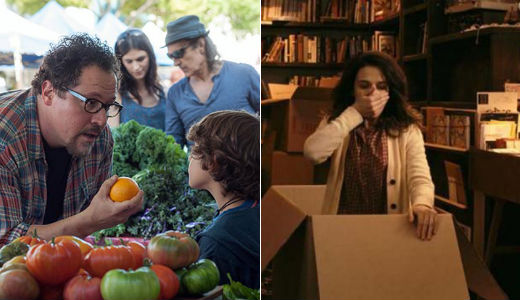Two Very Different Responses to Parenthood: Chef and Obvious Child
Among this summer’s successful indies were a pair of R-rated comedies depicting two very different responses to the formidable responsibilities of parenthood.

Jon Favreau’s Chef offers a rare depiction of a divorced workaholic and largely absent father who belatedly gets to know his young son. Gillian Robespierre’s Obvious Child offers an even rarer affirmative portrait of a single young woman unready for motherhood, or even adulthood, who decides to terminate an unplanned pregnancy. (Both are new on home video.)
Carl (Favreau) and Donna (Jenny Slate) are both creative souls: Carl is head chef in a San Francisco area restaurant, Donna does stand-up in a Brooklyn comedy club. Carl’s work has become too safely anonymous, relying on crowd-pleasing dishes; Donna’s style is overly personal and envelope-pushing, depending for its effect on a blend of audience discomfort and good will.
Both have dysfunctional personal lives. Carl is amicably divorced, with a 10-year-old son he seems never to have time for and a sporadic affair with his restaurant’s hostess (Scarlett Johansson). Donna, blindsided by a harsh breakup from a boyfriend put off by her onstage frankness about their sex life, rebounds with a drunken one-night stand.
Both films are meandering, low-conflict, and, in the end, perhaps a little too eager to please — though where Chef is ultimately a joyous, feel-good celebration of family ties as well as creative fulfillment, Obvious Child is a wrenching but firmly unconflicted affirmation of autonomy and self-determination through abortion rights.
Both characters face personal crises leading to public meltdowns. Afterward, Carl reluctantly follows a humble path to personal and professional redemption, reconnecting with his love of food, his creativity, and his son Percy. Donna’s path is much clearer, though more difficult, and, while her messy story wobbles toward a tentative happy ending, “redemption” as such isn’t really the point.
What Carl ultimately finds is that what his son wants from him is not prepackaged consumerist experiences (visits to the cineplex or amusement park), but to be a part of his dad’s life, to please him and be valued by him, to accomplish something meaningful. Ask a kid to take out the garbage and he may grumble every step, but he’ll work for hours in his dad’s food truck.
It would be too facile to call the sentimental Chef and the unsentimental Obvious Child polar opposites. More accurately, Obvious Child aspires to be the anti-Juno — a counterpoint to unexpected-pregnancy comedies ending with a childbirth.
Yet unlike Juno (or Chef), which had no agenda, Obvious Child has a definite agenda. Perhaps it’s really the anti-Bella: an indie message movie that conveys its message with a light touch, through actions and choices rather than speeches.
Yet even Bella, like Juno, was willing to hear two sides, not just one. Both films were clear about all the reasons why abortion might seem the best choice for their troubled female leads.
Obvious Child never allows this. Among all its characters a single point of view prevails with axiomatic, uncontroversial certitude: A woman’s right to choose is absolute and sovereign. Donna worries that her mother may have reservations, but this is unfounded. (“Thank God,” her mother says, “I thought you were moving to L.A.”)
And Donna’s choice is solely about herself. It’s a striking irony, given the titular reference to the Paul Simon song which asks, “Why deny the obvious child?” The title is ambiguous (Is Donna the obvious child?); still, it’s hard not to think of the child in the womb who is neither denied nor acknowledged — save once, with startling glibness. When a friend encouragingly tells Donna before a show to “kill it” onstage, she cracks, “I actually have an appointment to do that tomorrow.”
Like its oversharing protagonist, Obvious Child stakes its credibility on absolute, brutal honesty and frankness. Yet when it comes to the reality of what abortion is, its frankness fails. Perhaps neither film quite earns its happy ending, but Chef at least celebrates the things that make for happiness.
Related
![Chef [video]](/uploads/articles/chef.jpg)
Chef [video] (2014)
I watched pretty much the whole second half of this movie with a smile on my face.
Recent
- Crisis of meaning, part 3: What lies beyond the Spider-Verse?
- Crisis of meaning, part 2: The lie at the end of the MCU multiverse
- Crisis of Meaning on Infinite Earths, part 1: The multiverse and superhero movies
- Two things I wish George Miller had done differently in Furiosa: A Mad Max Saga
- Furiosa tells the story of a world (almost) without hope
Home Video
Copyright © 2000– Steven D. Greydanus. All rights reserved.